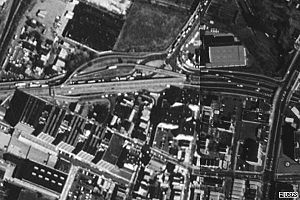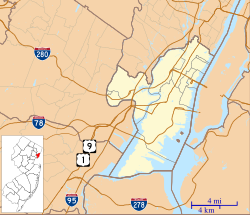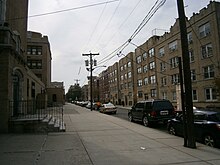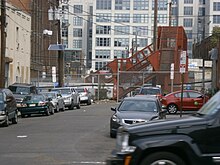
Hudson County is the smallest and most densely populated county in the U.S. state of New Jersey. It lies west of the lower Hudson River, which was named for Henry Hudson, the sea captain who explored the area in 1609. Part of New Jersey's Gateway Region in the New York metropolitan area, the county seat is Jersey City, which is the county's largest city in terms of both population and area.

The Journal Square Transportation Center is a multi-modal transportation hub located on Magnolia Avenue and Kennedy Boulevard at Journal Square in Jersey City, New Jersey, United States. Owned and operated by the Port Authority of New York and New Jersey, the complex includes a ten-story tower, a retail plaza, a bus terminal, a two-level parking facility, and the Journal Square station of the PATH rail transit system. The underground station has a high ceiling and a mezzanine level connecting the platforms.

White Manna and White Mana are the names of two fast food diners in the U.S. state of New Jersey, named after manna, the Biblical food. The restaurants were ranked on America's best burgers list along with White Rose Hamburgers, another New Jersey burger joint.
Paterson Plank Road is a road that runs through Passaic, Bergen and Hudson Counties in northeastern New Jersey. The route, originally laid in the colonial era, connects the city of Paterson and the Hudson River waterfront. It has largely been superseded by Route 3, but in the many towns it passes it has remained an important local thoroughfare, and in some cases been renamed.
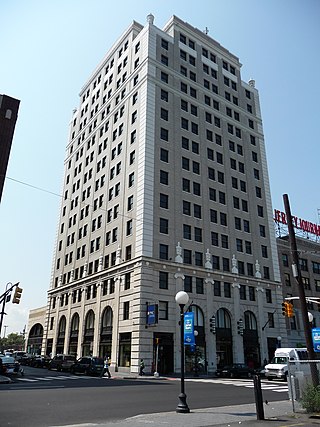
Journal Square is a business district, residential area, and transportation hub in Jersey City, New Jersey, which takes its name from the newspaper Jersey Journal whose headquarters were located there from 1911 to 2013. The "square" itself is at the intersection of Kennedy Boulevard and Bergen Avenue. The broader area extends to and includes Bergen Square, McGinley Square, India Square, the Five Corners and parts of the Marion Section. Many local, state, and federal agencies serving Hudson County maintain offices in the district.

Croxton is a section of Jersey City in the New Jersey Meadowlands in Hudson County, in the U.S. state of New Jersey.
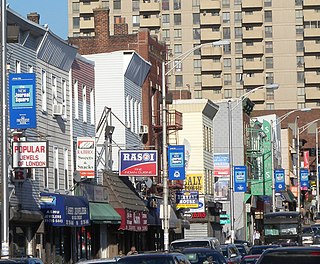
India Square, also known as "Little India," is a commercial and restaurant district in the Journal Square and Marion Section neighborhoods of Jersey City, New Jersey, US.

Bayfront is an urban redevelopment project in Jersey City, New Jersey.

Hackensack River Greenway, once known as the Hackensack RiverWalk, a is partially constructed greenway along the Newark Bay and Hackensack River in Hudson County, New Jersey, United States.
Communipaw is a neighborhood in Jersey City in Hudson County, in the U.S. state of New Jersey. It is located west of Liberty State Park and east of Bergen Hill, and the site of one of the earliest European settlements in North America. It gives its name to the historic avenue which runs from its eastern end near Liberty State Park Station through the neighborhoods of Bergen-Lafayette and the West Side that then becomes the Lincoln Highway. Communipaw Junction, or simply The Junction, is an intersection where Communipaw, Summit Avenue, Garfield Avenue, and Grand Street meet, and where the toll house for the Bergen Point Plank Road was situated. Communipaw Cove at Upper New York Bay, is part of the 36-acre (150,000 m2) state nature preserve in the park and one of the few remaining tidal salt marshes in the Hudson River estuary.

The West Side of Jersey City is an area made up of several diverse neighborhoods on either side of West Side Avenue, one of the city's main shopping streets. Parallel and west of Kennedy Boulevard, West Side Avenue carries two county route designations.
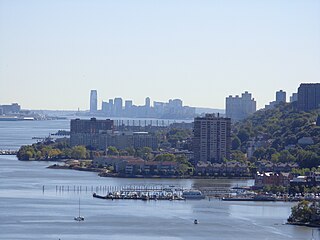
The Hudson Waterfront is an urban area of northeastern New Jersey along the lower reaches of the Hudson River, the Upper New York Bay and the Kill van Kull. Though the term can specifically mean the shoreline, it is often used to mean the contiguous urban area between the Bayonne Bridge and the George Washington Bridge that is approximately 19 miles (31 km) long. Historically, the region has been known as Bergen Neck, the lower peninsula, and Bergen Hill, lower Hudson Palisades. It has sometimes been called the Gold Coast.

Riverbend is the name of two sections of Hudson County, New Jersey.

County Route 617 is 4.55-mile (7.32 km) long and follows one street, Summit Avenue along the ridge of the Hudson Palisades in Hudson County, New Jersey. Its southern end is CR 622, or Grand Street, at Communipaw Junction in the Bergen-Lafayette Section of Jersey City. Its northern end is CR 691, 32nd Street, a section of the Bergen Turnpike, in Union City.

Canal Crossing is a New Urbanism project on the eastern side of Jersey City, New Jersey between Jackson Hill in Greenville/Bergen-Lafayette and Liberty State Park. The approximately 111 acre area, previously designated for industrial and distribution uses has been re-zoned for transit-oriented residential and commercial use and the construction of a neighborhood characterized as a sustainable community. The name is inspired by the Morris Canal, which once traversed the district in a general north and south alignment. The brownfield site must first undergo remediation of toxic waste, much of it left by PPG Industries The redevelopment plans call for 7,000 housing units, mainly "mid-rise" buildings, and a greenway along the former canal, directly south of the 17-acre Berry Lane Park.
The United States Environmental Protection Agency added the PJP Landfill site in Marion Section of Jersey City, New Jersey to the Superfund National Priorities List on September 1, 1983, because hazardous chemicals were found in the soil and groundwater. The 87-acre site located in Hudson County contained a landfill that may have been used as early as 1968 to dispose of chemical and industrial wastes. In 1971 the State certified the landfill to receive solid wastes. Approximately 11,900 people currently reside within a one-mile radius of the site. The west side of the site is bordered by the Hackensack River which is used for boating and commercial shipping. Recently, AMB Corporation purchased a portion of the site.
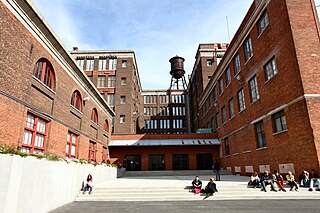
Mana Contemporary is a cultural center in Jersey City, New Jersey, United States with affiliated centers in Chicago and Miami.
Skyway Park is a 32-acre (13 ha) park being developed in Jersey City, New Jersey on the Hackensack River, partly under the Pulaski Skyway, from which it takes its name. The brownfield land was the site of the PJP Landfill. It is a component of the Hackensack RiverWalk, a linear park along the banks of the river and Newark Bay.
